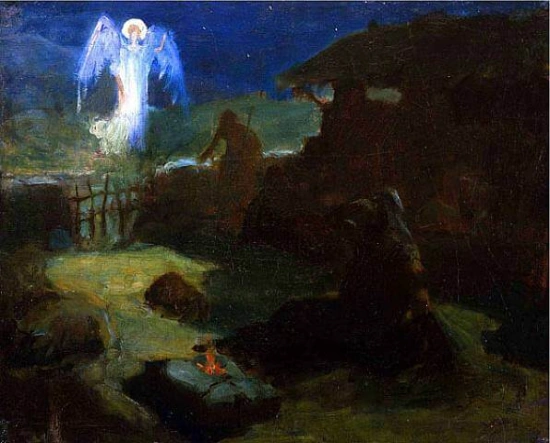4594. 'That is, Bethlehem' means a new spiritual of the celestial raised up in place of it. This is clear from the meaning of 'Bethlehem' as the spiritual of the celestial within the new state, for 'Ephrath' is the spiritual of the celestial within the initial state, 4585, while her burial there means the raising up of a new state, 4593. The fact that Bethlehem was the place where Rachel gave birth to her second son, Benjamin, and died in giving birth to him, also the place where David was born and where he was anointed king, and finally the place where the Lord was born, involves an arcanum which has not yet been revealed. Nor could it have been revealed to anyone who did not know what was meant by 'Ephrath' and by 'Bethlehem', and what was represented by 'Benjamin' and also by 'David'. Least of all could it have been revealed to anyone who did not know what the spiritual of the celestial was; for this is what was meant spiritually by those places and what was represented by those personages.
[2] The reason the Lord was born there and nowhere else was that He alone has been born a spiritual-celestial man. Everyone else has been born a natural man with the ability or capacity to become, through regeneration by the Lord, either celestial or spiritual. The Lord was born a spiritual-celestial man to the end that He might make His Human Divine, doing so according to order from the lowest degree to the highest, and so would bring order to everything in the heavens and everything in the hells. For the spiritual of the celestial is an intermediate part between the natural or external man and the rational or internal man, see above in 4585, 4592, so that below it there was the natural or external, and above it the rational or internal.
[3] Until he can grasp these things no one will ever come to understand in the light of any revelation at all why the Lord was born in Bethlehem. From most ancient times 'Ephrath' meant the spiritual of the celestial, as therefore did 'Bethlehem' subsequently. This now explains why the following words occur in David,
He swore to Jehovah, he made a vow to the Mighty One of Jacob, If I enter the tent of my house, if I go up onto the couch of my bed, if I give sleep to my eyes, slumber to my eyelids, until I find a place for Jehovah, dwelling-places for the Mighty One of Jacob. Behold, we heard of Him in Ephrath, we found Him in the fields of the forest; we will enter His dwelling-places, and bow down at His footstool. Psalms 132:2-7.
It is quite evident that these words are used to refer to the Lord. In the original language the pronoun 'Him' in 'we have heard of Him' and in 'we have found Him' is expressed by a letter added to the end of the verb - by the letter H, taken from the name Jehovah.
[4] And in Micah,
You, Bethlehem Ephrath, it is little that you are among the thousands of Judah; from you will come forth for Me one who will be ruler in Israel; and His origins are from of old, from the days of eternity Micah 5:2; Matthew 2:6.
From these prophecies it was well known to the Jewish people that the Messiah or Christ was to be born in Bethlehem, as is clear in Matthew,
Assembling all the chief priests and scribes of the people Herod inquired of them where the Christ (the Messiah) was to be born. They told him, In Bethlehem of Judea. Matthew 2:4-5.
And in John,
The Jews said, Does not the Scripture say that the Christ (the Messiah) is going to come from the seed of David, and from Bethlehem, the city where David was? John 7:42.
His birth did in fact take place there, see Matthew 2:1; Luke 2:4-7. For this reason also, and because He was descended from David, the Lord is called 'a shoot from the stem of Jesse', and 'the root of Jesse', Isaiah 11:1, 10. For Jesse, David's father, was a Bethlehemite, and David was born there and also anointed king there, 1 Samuel 16:1-14; 17:12, for which reason Bethlehem was called the city of David, Luke 2:4, 11; John 7:42. David in particular represents the Lord's kingship or Divine Truth, 1888.







